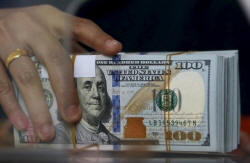|
 Dollar
slips after solid gains, investors await Fed minutes Dollar
slips after solid gains, investors await Fed minutes
 Send a link to a friend
Send a link to a friend
[November 18, 2015]
By Anirban Nag
LONDON (Reuters) - The dollar slipped from
a seven-month high against a basket of currencies on Wednesday as
markets awaited minutes of the Federal Reserve's recent policy meeting
which could reinforce expectations of a rate hike next month.
|
|
 But with the Fed likely to flag concerns about the currency's recent
strength, there were signs of wariness building in the long dollar
trade. But with the Fed likely to flag concerns about the currency's recent
strength, there were signs of wariness building in the long dollar
trade.
"It will be a case of range-trading going into the Fed minutes. We
could see some positions being pared, with the dollar having risen
in the past few weeks," said Jeremy Stretch, head of currency
strategy at CIBC World Markets.
"The market is also mindful that the Fed may refer to the dollar's
strength either implicitly or obliquely and that its rise has been
tightening monetary conditions. That should make any hikes a rather
slow and gradual process."
The dollar index has risen 6.3 percent in the past month as
market odds for an interest rate hike in December moved from around
30 percent to 66 percent. The Fed's broad-based dollar
trade-weighted index has also pushed higher.

The index was 0.1 percent lower at 99.535 after touching 99.745 on
Tuesday, its highest since mid April. The dollar was also slightly
lower against the safe-haven yen and the Swiss franc.
The dollar's dip saw the euro regain ground despite what traders
described as caution in early trading as French police hunted a
Belgian militant suspected of masterminding last week's attacks on
Paris.
The single currency rose to $1.0673, having dropped to a seven-month
low of $1.0630 on Tuesday. The euro has been losing ground on
expectations the European Central Bank will ease monetary policy
further in December, with many forecasters predicting it will reach
parity with the dollar.
[to top of second column] |

Pascal Blanque, chief investment officer at Amundi Asset Management
told the Reuters Investment Summit that the bulk of the directional
impact from quantitative easing by major central banks on exchange
rates was "behind us".
"To an extent, I think it has become more uncertain compared to
let's say two years ago," he said.
Comments on Tuesday by ECB chief economist and executive board
member Peter Praet, who told Bloomberg downside risks may have
increased in light of the events in Paris, reinforced expectations
of further stimulus.
The euro lurched lower after Paris attacks as investors fretted
about their potential impact on the euro zone economy.
(Editing by Catherine Evans)
[© 2015 Thomson Reuters. All rights
reserved.] Copyright 2015 Reuters. All rights reserved. This material may not be published,
broadcast, rewritten or redistributed.
 |